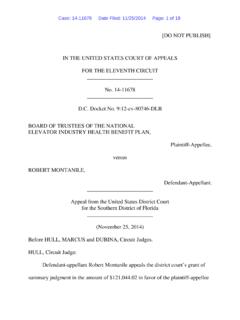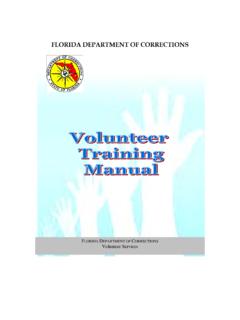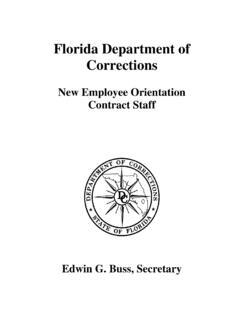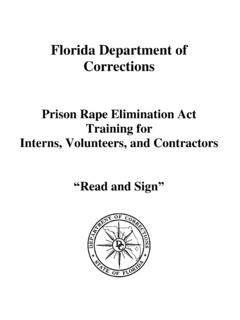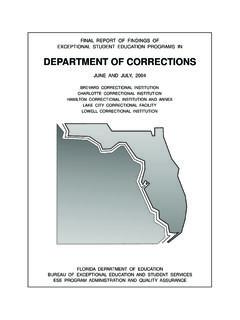Transcription of Case: 15-14117 Date Filed: 07/14/2016 Page: 1 of 15
1 [PUBLISH] IN THE UNITED STATES COURT OF APPEALS FOR THE ELEVENTH CIRCUIT _____ No. 15-14117 _____ Docket No. 1:12-cv-22958-PAS UNITED STATES OF AMERICA, Plaintiff-Appellee, versus SECRETARY, florida department OF CORRECTIONS, florida department OF CORRECTIONS Defendants-Appellants. _____ Appeal from the United States District Court for the Southern District of florida _____ (July 14, 2016) Before WILLIAM PRYOR and JILL PRYOR, Circuit Judges, and STORY,* District Judge. WILLIAM PRYOR, Circuit Judge: * Honorable Richard W. Story, United States District Judge for the Northern District of Georgia, sitting by designation. Case: 15-14117 Date Filed: 07/14/2016 Page: 1 of 15 2 This appeal requires us to decide whether the Religious Land Use and Institutionalized Persons Act, 42 2000cc et seq.
2 , prevents the Secretary of the florida department of Corrections from denying kosher meals to inmates whose sincere religious beliefs require them to keep kosher. After the United States sued the Secretary to compel the department to provide kosher meals, but before the entry of an injunction, the Secretary voluntarily cr eated a religious diet program. Even so, the Secretary continues to insist that the department need not provide kosher meals because denying them is the least restrictive means of furthering a compelling governmental interest in containing costs. But the Secretary s argument lacks any support in the record. We affirm the summary judgment for the United States and the permanent injunction requiring the Secretary to provide kosher meals to the inmates. I. BACKGROUND Since the 1990s, the florida department of Corrections has offered inmates regular meals, meatless meals, and vegan meals.
3 It began offering kosher meals in 2004, but it stopped in 2007. It resumed offering kosher meals in 2010, but only as part of a pilot program at one facility. In 2011, the Civil Rights Division of the United States department of Justice opened an investigation into the denial of kosher food by the department of Corrections. At the time, the department of Corrections offered regular, vegan, Case: 15-14117 Date Filed: 07/14/2016 Page: 2 of 15 3 meatless, medical, and therapeutic options to prisoners outside of the pilot program. None of these diets satisfied the most orthodox version of the laws of kashrut, which prohibit certain food, such as pork, and demand that food be stored, prepared, and served in a certain manner. Moussazadeh v. Tex. Dep t of Criminal Justice, 703 781, 786 (5th Cir.)
4 2012). The only choice for prisoners outside the pilot program with these religious obligations was, in the words of one prisoner, to d[o] what a hungry man does, and pray[] for understanding. In 2012, the Civil Rights Division concluded that the department of Corrections was violating the Religious Land Use and Institutionalized Persons Act and asked the Secretary to comply. The Secretary refused, and the United States sued for declaratory and injunctive relief in August 2012. In March 2013, the Secretary issued Procedure , which created a religious diet program. The program offered inmates three choices: the existing non-meat option, the existing vegan option, and a new kosher certified food option for inmates for whom no other meal option offered by the department .. is capable of meeting the diet requirements of that inmate s professed religious faith.
5 The certified food option initially used nationally recognized, religiously certified prepackaged processed foods. In October 2013, the Secretary revised the certified food option to allow a standardized menu prepared in accordance with Case: 15-14117 Date Filed: 07/14/2016 Page: 3 of 15 4 religious dietary guidelines in a dedicated work area established exclusively for preparation of certified food option meals. In February 2014, the Secretary again revised the certified food option to allow meals utilizing food items served in their natural state. The certified food option now consists of peanut butter, cereal, bread, sardines, cabbage, beans, carrots, crackers, and an occasional piece of fruit, all served cold. The religious diet program initially had several policies that limited admission and continued participation.
6 The application tested prisoners sincerity by asking them to cite specific law(s) connected to your belief or faith that require(s) you to eat a religious diet and by creating a waiting period for admission to the Program. The rules provided for the removal of an inmate who misses ten percent (10%) or more of her/his CFO meals within a month (the ten-percent rule), who is discovered purchasing, possessing, or consuming food from the canteen or other source that violates the religious diet requirements (the zero-tolerance rule), or who barters kosher food for non-kosher food (the anti-bartering rule). A prisoner could challenge his removal from the religious diet program, but he would have to eat from the mainline during the grievance process, which could last up to 30 days. In April 2013, the United States moved for a preliminary injunction ordering the Secretary to provide a certified kosher diet to all inmates with a sincere Case: 15-14117 Date Filed: 07/14/2016 Page: 4 of 15 5 religious basis for keeping kosher.
7 The United States also asked the district court to enjoin the religious diet program to the extent that it violated the Religious Land Use and Institutionalized Persons Act. In December 2013, the district court entered a preliminary injunction that ordered the Secretary to provide kosher meals. The district court also prohibited enforcement of the waiting period, the doctrinal sincerity testing, the ten-percent rule, and the zero-tolerance rule. The parties and the district court later agreed to modified versions of the ten-percent rule and the zero-tolerance rule. We vacated the injunction in 2015 because the district court failed to make certain findings required by the Prison Litigation Reform Act. See United States v. Sec y, Fla. Dep t of Corr., 778 1223, 1228 30 (11th Cir. 2015). Meanwhile, the department continued to implement the religious diet program.
8 The certified food option began at one facility in July 2013, and the department provided the option at all facilities by April 2015. As of March 2015, the department had approved 9,543 prisoners out of a total population of over 100,000. But participation rates at individual institutions declined over time, in part because prisoners without sincere religious beliefs tired of the repetitive and cold meals. Enforcement of the modified rules limiting participation in the program has been uneven. A food director employed by the department testified that enrolled Case: 15-14117 Date Filed: 07/14/2016 Page: 5 of 15 6 prisoners collected only 15 percent of their kosher meals overall one month, but the food director also testified that he was unaware of any prisoners being removed for eating from the mainline.
9 A chaplain employed by the department testified that he helps prisoners identify religious reasons for participating and that he has not suspended or removed prisoners for eating non-kosher food from the canteen. The chaplaincy administrator testified that he instructed chaplains not to remove prisoners who eat from the mainline and that he had no knowledge of such a removal. And a food service worker employed by the department testified that the central office instructed him to stop suspending prisoners from the program. The United States estimates a future annual cost of $384,400 for the program, but the Secretary estimates a future annual cost as high as $ million. The United States uses a lower estimate of how many prisoners will participate and how often prisoners will skip meals. The parties also disagree about how to allocate the cost of staff and equipment assigned to both the program and the mainline.
10 Assuming that no prisoners skip meals, the certified food option costs $ per prisoner per day, the mainline option costs $ per prisoner per day, the vegan option costs $ per prisoner per day, and the medical and therapeutic diets cost between $ and $ per prisoner per day. Participants in the mainline option eat 85 percent of their meals, and participants in the certified food Case: 15-14117 Date Filed: 07/14/2016 Page: 6 of 15 7 option eat 75 percent of their meals. The department reduces its cost for the mainline option by anticipating how many meals prisoners will eat, and it further reduces the cost of the mainline meal by using its farm produce program and reusing leftover food. In his deposition, the chief procurement officer for the department testified that the cost of the program was sustainable.
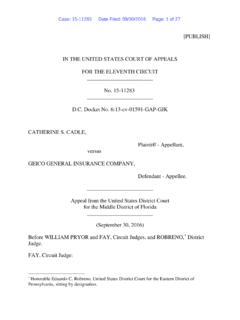


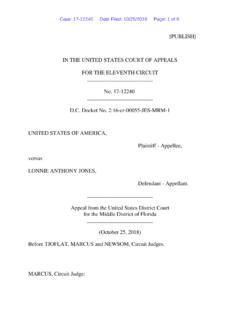
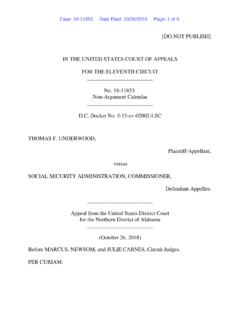
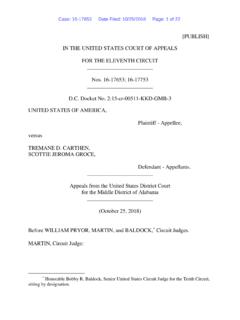
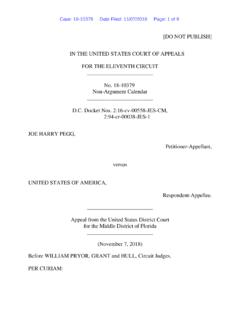
![[PUBLISH] IN THE UNITED STATES COURT OF APPEALS FOR …](/cache/preview/0/7/3/4/8/4/4/6/thumb-07348446070f9a9adbdc796d3164ec9c.jpg)

